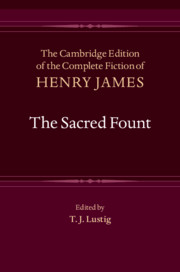Book contents
- Frontmatter
- Contents
- List of Illustrations
- Acknowledgements
- List of Abbreviations
- General Editors’ Preface
- General Chronology of James’s Life and Writings
- Introduction
- Contemporary Reception of The Sacred Fount
- Textual Introduction
- Chronology of Composition and Production
- Bibliography
- The Sacred Fount
- Glossary of Foreign Words and Phrases
- Notes
- Textual Variants
- Emendations
VI
Published online by Cambridge University Press: 11 April 2021
- Frontmatter
- Contents
- List of Illustrations
- Acknowledgements
- List of Abbreviations
- General Editors’ Preface
- General Chronology of James’s Life and Writings
- Introduction
- Contemporary Reception of The Sacred Fount
- Textual Introduction
- Chronology of Composition and Production
- Bibliography
- The Sacred Fount
- Glossary of Foreign Words and Phrases
- Notes
- Textual Variants
- Emendations
Summary
I SAW other things, many things, after this, but I had already so much matter for reflection that I saw them almost in spite of myself. The difficulty with me was in the momentum already acquired by the act—as well as, doubtless, by the general habit—of observation. I remember indeed that on separating from Mrs. Brissenden I took a lively resolve to get rid of my ridiculous obsession. It was absurd to have consented to such immersion, intellectually speaking, in the affairs of other people. One had always affairs of one's own, and I was positively neglecting mine. Such, for a while, was my foremost reflection; after which, in their order or out of it, came an inevitable train of others. One of the first of these was that, frankly, my affairs were by this time pretty well used to my neglect. There were connections enough in which it had never failed. A whole cluster of such connections, effectually displacing the centre of interest, now surrounded me, and I was—though always but intellectually—drawn into their circle. I did my best for the rest of the day to turn my back on them, but with the prompt result of feeling that I meddled with them almost more in thinking them over in isolation than in hovering personally about them. Reflection was the real intensity; reflection, as to poor Mrs. Server in particular, was an indiscreet opening of doors. She became vivid in the light of the so limited vision of her that I already possessed—try positively as I would not further to extend it. It was something not to ask another question, to keep constantly away both from Mrs. Brissenden and from Ford Obert, whom I had rashly invited to a degree of participation; it was something to talk as hard as possible with other persons and on other subjects, to mingle in groups much more superficial than they supposed themselves, to give ear to broader jokes, to discuss more tangible mysteries.
The day, as it developed, was large and hot, an unstinted splendour of summer; excursions, exercise, organised amusement were things admirably spared us; life became a mere arrested ramble or stimulated lounge, and we profited to the full by the noble freedom of Newmarch, that overarching ease which in nothing was so marked as in the tolerance of talk.
- Type
- Chapter
- Information
- The Sacred Fount , pp. 52 - 62Publisher: Cambridge University PressPrint publication year: 2019

